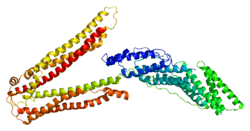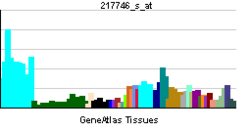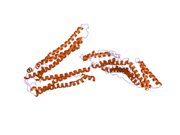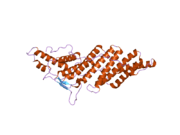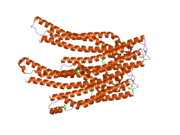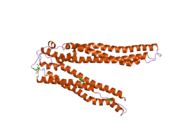PDCD6IP
| View/Edit Human | View/Edit Mouse |
Programmed cell death 6-interacting protein is a protein that in humans is encoded by the PDCD6IP gene.[3][4]
This gene encodes a protein thought to participate in programmed cell death. Studies using mouse cells have shown that overexpression of this protein can block apoptosis. In addition, the product of this gene binds to the product of the PDCD6 gene, a protein required for apoptosis, in a calcium-dependent manner. This gene product also binds to endophilins, proteins that regulate membrane shape during endocytosis. Overexpression of this gene product and endophilins results in cytoplasmic vacuolization which may be partly responsible for the protection against cell death.[4]
Interactions
PDCD6IP has been shown to interact with PDCD6.[3][5]
References
- ↑ "Human PubMed Reference:".
- ↑ "Mouse PubMed Reference:".
- 1 2 Vito P, Pellegrini L, Guiet C, D'Adamio L (Feb 1999). "Cloning of AIP1, a novel protein that associates with the apoptosis-linked gene ALG-2 in a Ca2+-dependent reaction". J Biol Chem. 274 (3): 1533–40. doi:10.1074/jbc.274.3.1533. PMID 9880530.
- 1 2 "Entrez Gene: PDCD6IP programmed cell death 6 interacting protein".
- ↑ Satoh, Hirokazu; Shibata Hideki; Nakano Yoshimi; Kitaura Yasuyuki; Maki Masatoshi (Mar 2002). "ALG-2 interacts with the amino-terminal domain of annexin XI in a Ca(2+)-dependent manner". Biochem. Biophys. Res. Commun. United States. 291 (5): 1166–72. doi:10.1006/bbrc.2002.6600. ISSN 0006-291X. PMID 11883939.
Further reading
- Wood JD, Yuan J, Margolis RL, et al. (1998). "Atrophin-1, the DRPLA gene product, interacts with two families of WW domain-containing proteins". Mol. Cell. Neurosci. 11 (3): 149–60. doi:10.1006/mcne.1998.0677. PMID 9647693.
- Missotten M, Nichols A, Rieger K, Sadoul R (1999). "Alix, a novel mouse protein undergoing calcium-dependent interaction with the apoptosis-linked-gene 2 (ALG-2) protein". Cell Death Differ. 6 (2): 124–9. doi:10.1038/sj.cdd.4400456. PMID 10200558.
- Nagase T, Kikuno R, Ishikawa KI, et al. (2000). "Prediction of the coding sequences of unidentified human genes. XVI. The complete sequences of 150 new cDNA clones from brain which code for large proteins in vitro". DNA Res. 7 (1): 65–73. doi:10.1093/dnares/7.1.65. PMID 10718198.
- Wu Y, Pan S, Che S, et al. (2002). "Overexpression of Hp95 induces G1 phase arrest in confluent HeLa cells". Differentiation. 67 (4–5): 139–53. doi:10.1046/j.1432-0436.2001.670406.x. PMID 11683497.
- Satoh H, Shibata H, Nakano Y, et al. (2002). "ALG-2 interacts with the amino-terminal domain of annexin XI in a Ca(2+)-dependent manner". Biochem. Biophys. Res. Commun. 291 (5): 1166–72. doi:10.1006/bbrc.2002.6600. PMID 11883939.
- Chatellard-Causse C, Blot B, Cristina N, et al. (2002). "Alix (ALG-2-interacting protein X), a protein involved in apoptosis, binds to endophilins and induces cytoplasmic vacuolization". J. Biol. Chem. 277 (32): 29108–15. doi:10.1074/jbc.M204019200. PMID 12034747.
- Wu Y, Pan S, Luo W, et al. (2002). "Hp95 promotes anoikis and inhibits tumorigenicity of HeLa cells". Oncogene. 21 (44): 6801–8. doi:10.1038/sj.onc.1205849. PMID 12360406.
- Strausberg RL, Feingold EA, Grouse LH, et al. (2003). "Generation and initial analysis of more than 15,000 full-length human and mouse cDNA sequences". Proc. Natl. Acad. Sci. U.S.A. 99 (26): 16899–903. doi:10.1073/pnas.242603899. PMC 139241
 . PMID 12477932.
. PMID 12477932. - Vincent O, Rainbow L, Tilburn J, et al. (2003). "YPXL/I is a protein interaction motif recognized by aspergillus PalA and its human homologue, AIP1/Alix". Mol. Cell. Biol. 23 (5): 1647–55. doi:10.1128/MCB.23.5.1647-1655.2003. PMC 151718
 . PMID 12588984.
. PMID 12588984. - Schmidt MH, Chen B, Randazzo LM, Bogler O (2004). "SETA/CIN85/Ruk and its binding partner AIP1 associate with diverse cytoskeletal elements, including FAKs, and modulate cell adhesion". J. Cell. Sci. 116 (Pt 14): 2845–55. doi:10.1242/jcs.00522. PMID 12771190.
- Katoh K, Shibata H, Suzuki H, et al. (2003). "The ALG-2-interacting protein Alix associates with CHMP4b, a human homologue of yeast Snf7 that is involved in multivesicular body sorting". J. Biol. Chem. 278 (40): 39104–13. doi:10.1074/jbc.M301604200. PMID 12860994.
- Leonard D, Ajuh P, Lamond AI, Legerski RJ (2003). "hLodestar/HuF2 interacts with CDC5L and is involved in pre-mRNA splicing". Biochem. Biophys. Res. Commun. 308 (4): 793–801. doi:10.1016/S0006-291X(03)01486-4. PMID 12927788.
- Strack B, Calistri A, Craig S, et al. (2003). "AIP1/ALIX is a binding partner for HIV-1 p6 and EIAV p9 functioning in virus budding". Cell. 114 (6): 689–99. doi:10.1016/S0092-8674(03)00653-6. PMID 14505569.
- von Schwedler UK, Stuchell M, Müller B, et al. (2003). "The protein network of HIV budding". Cell. 114 (6): 701–13. doi:10.1016/S0092-8674(03)00714-1. PMID 14505570.
- Martin-Serrano J, Yarovoy A, Perez-Caballero D, et al. (2003). "Divergent retroviral late-budding domains recruit vacuolar protein sorting factors by using alternative adaptor proteins". Proc. Natl. Acad. Sci. U.S.A. 100 (21): 12414–9. doi:10.1073/pnas.2133846100. PMC 218772
 . PMID 14519844.
. PMID 14519844. - Peck JW, Bowden ET, Burbelo PD (2004). "Structure and function of human Vps20 and Snf7 proteins". Biochem. J. 377 (Pt 3): 693–700. doi:10.1042/BJ20031347. PMC 1223912
 . PMID 14583093.
. PMID 14583093. - Katoh K, Shibata H, Hatta K, Maki M (2004). "CHMP4b is a major binding partner of the ALG-2-interacting protein Alix among the three CHMP4 isoforms". Arch. Biochem. Biophys. 421 (1): 159–65. doi:10.1016/j.abb.2003.09.038. PMID 14678797.
- Ota T, Suzuki Y, Nishikawa T, et al. (2004). "Complete sequencing and characterization of 21,243 full-length human cDNAs". Nat. Genet. 36 (1): 40–5. doi:10.1038/ng1285. PMID 14702039.
- Matsuo H, Chevallier J, Mayran N, et al. (2004). "Role of LBPA and Alix in multivesicular liposome formation and endosome organization". Science. 303 (5657): 531–4. doi:10.1126/science.1092425. PMID 14739459.
External links
- PDCD6IP human gene location in the UCSC Genome Browser.
- PDCD6IP human gene details in the UCSC Genome Browser.
This article is issued from Wikipedia - version of the 6/4/2016. The text is available under the Creative Commons Attribution/Share Alike but additional terms may apply for the media files.
